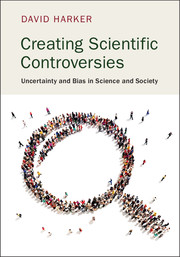Book contents
- Frontmatter
- Dedication
- Contents
- Preface
- Introduction: scientific authority and the created controversy
- Part I Lessons from the Philosophy of Science
- Part II Biases, Arguments and Created Controversies
- 5 Inherent irrationality: cognitive biases and heuristics
- 6 Thinking more clearly: arguments, reasoning and informal fallacies
- 7 Created controversies and how to detect them
- Points to remember: Part II
- Part III Exposing Created Controversies
- Concluding remarks
- References
- Index
5 - Inherent irrationality: cognitive biases and heuristics
from Part II - Biases, Arguments and Created Controversies
Published online by Cambridge University Press: 05 October 2015
- Frontmatter
- Dedication
- Contents
- Preface
- Introduction: scientific authority and the created controversy
- Part I Lessons from the Philosophy of Science
- Part II Biases, Arguments and Created Controversies
- 5 Inherent irrationality: cognitive biases and heuristics
- 6 Thinking more clearly: arguments, reasoning and informal fallacies
- 7 Created controversies and how to detect them
- Points to remember: Part II
- Part III Exposing Created Controversies
- Concluding remarks
- References
- Index
Summary
When Ola Svenson surveyed American students about their driving skills, 46 per cent estimated that they were among the most skilled 20 per cent, and 93 per cent of those surveyed placed themselves in the top 50 per cent. Doctors who observe several patients that all have the same illness are more likely to diagnosis the same illness in subsequent patients who don't have it, even in the case of noncontagious diseases. Subjects in a study who had been manipulating words like Florida, wrinkle, grey and bald, walked away from the testing room more slowly than those subjects who had been manipulating sets of words that don't induce thoughts of old age. These represent just a few of many studies that demonstrate how our decisions, behaviour, memories and beliefs can be influenced in ways that we're wholly unconscious of. Not only are we unaware of these subconscious influences, but in some cases our beliefs are being shaped in demonstrably irrational ways.
In Chapter 2 we discovered that our perceptions of the world can be influenced by expectation, among other things. We were reminded that what we perceive doesn't always reflect how things are. In this chapter, we observe that how we reason from available evidence to conclusions and beliefs is also subject to systematic and often predictable error. These errors have enormous significance for our appraisal of those scientific issues where scientific opinion might appear divided. In some instances we're inappropriately influenced by prior commitments in our assessment of new data, or overly influenced by considerations that come more readily to mind, or overconfident in our abilities to understand, predict and adjudicate. One purpose of this foray into cognitive psychology is to forearm ourselves against the possibility that each of us is placing more trust in our individual abilities than is appropriate. A little humility and greater awareness for the ways in which we're vulnerable to error represent key steps towards improving our reasoning abilities.
Confirmation bias
Confirmation bias is a well-known, widespread and well-studied cognitive bias. It describes our tendency to prefer, or actively seek out, evidence that supports rather than challenges our pre-existing beliefs or desires. Consider Jones, for purposes of illustration, who has a poor opinion of women drivers and who occasionally witnesses instances of reckless driving. If the gender of the driver is unknown, Jones confidently predicts that the driver is female.
- Type
- Chapter
- Information
- Creating Scientific ControversiesUncertainty and Bias in Science and Society, pp. 111 - 131Publisher: Cambridge University PressPrint publication year: 2015



